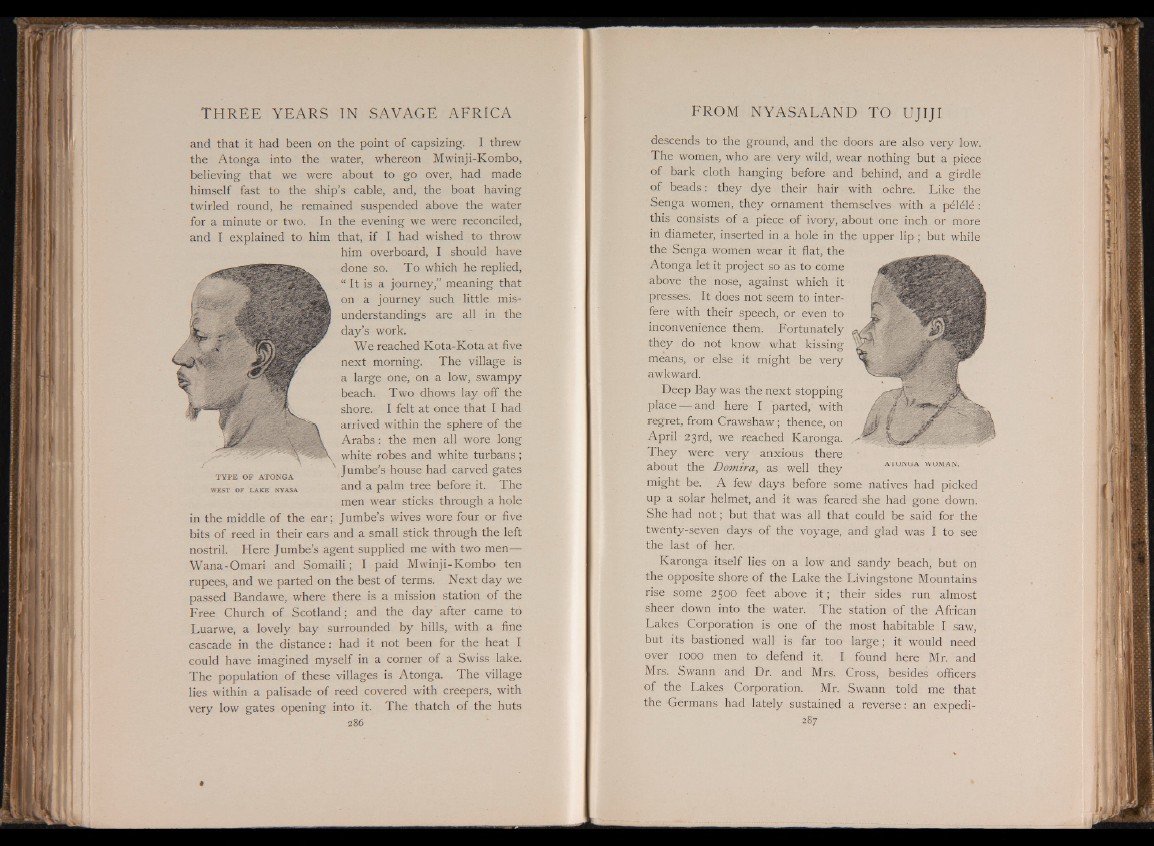
and that it had been on the point of capsizing. I threw
the Atonga into the water, whereon Mwinji-Kombo,
believing that we were about to go over, had made
himself fast to the ship’s cable, and, the boat having
twirled round, he remained suspended above the water
for a minute or two. In the evening we were reconciled,
and I explained to him that, if I had wished to throw
him overboard, I should have
done so. To which he replied,
“ It is a journey,” meaning that
on a journey such little misunderstandings
are all in the
day’s work.
We reached Kota-Kota at five
next morning. The village is
a large one, on a low, swampy
beach. Two dhows lay off the
shore. I felt at once that I had
arrived within the sphere of the
Arabs: the men all wore long
white robes and white turbans;
Tumbe’s house had carved gates
T Y P E OF ATONGA J °
w e s t OF l a k e n y a s a and a palm tree before it. The
men wear sticks through a hole
in the middle of the ear; Jumbe’s wives wore four or five
bits of reed in their ears and a small stick through the left
nostril. Here Jumbe’s agent supplied me with two men—
Wana-Omari and Somaili; I paid Mwinji-Kombo ten
rupees, and we parted on the best of terms. Next day we
passed Bandawe, where there is a mission station of the
Free Church of Scotland; and the day after came to
Luarwe, a lovely bay surrounded by hills, with a fine
cascade in the distance: had it not been for the heat I
could have imagined myself in a corner of a Swiss lake.
The population of these villages is Atonga. The village
lies within a palisade of reed covered with creepers, with
very low gates opening into it. The thatch of the huts
286
descends to the ground, and the doors are also very low.
The women, who are very wild, wear nothing but a piece
of bark cloth hanging before and behind, and a girdle
of beads: they dye their hair with ochre. Like the
Senga women, they ornament themselves with a pélélé:
this consists of a piece of ivory, about one inch or more
in diameter, inserted in a hole in the upper lip; but while
the Senga women wear it flat, the
Atonga let it project so as to come
above the nose, against which it
presses. It does not seem to interfere
with their speech, or even to
inconvenience them. Fortunately
they do not know what kissing
means, or else it might be very
awkward.
Deep Bay was the next stopping
place — and here I parted,' with
regret, from Crawshaw; thence, on
April 23 rd, we reached Karonga.
They were very anxious there
about the Domira, as Well they a t o n g a w o m a n .
might be. A few days before some natives had picked
up a solar helmet, and it was feared she had gone down.
She had not; but that was all that could be said for the
twenty-seven days of the voyage, and glad was I to see
the last of her.
Karonga itself lies on a low and sandy beach, but on
the opposite shore of the Lake the Livingstone Mountains
rise some 2500 feet above it; their sides run almost
sheer down into the water. The station of the African
Lakes Corporation is one of the most habitable I saw,
but its bastioned wall is far too large; it would need
over 1000 men to defend it. I found here Mr. and
Mrs. Swann and Dr. and Mrs. Cross, besides officers
of the Lakes Corporation. Mr. Swann told me that
the Germans had lately sustained a reverse: an expedi-
287